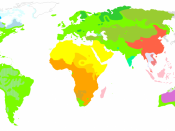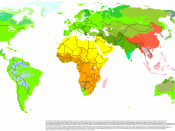Introduction.
It is very important for a translator to know the relationships of language, culture and translation. In the essay I discuss them.
What is language?
Language is the characteristic of human being. Animals' language is only a stimulus-bound, which can't compare with man's language in expressing functions and complexity.
Linguistic ability is a special ability, which was obtained by long biological envolution. Physiologist proved that there is a nervous system controlling the language. When a child is seven or eight years old, his nervous system of human language lateralized. In general, nervous system of human language is in left side of brain except left-nimbled persons whose linguistic systems are perhaps in right brain. Animals can't learn human language because they have no physiological base of linguistic ability. Therefore, man needs linguistic environment in order to obtain linguistic ability. When a baby was bore, if he lived in seclusion, he would never learn language.
Learning language has a key period. He can't master the language if he loses the good period. Many experiments have been proved the fact. So language possesses social phenomenon of special physiological base.
Language can mean two fundamental things, both of which arte intimately linked to culture: through what it says or what refers to as an encoded sign (semantic), and through what it does as an action in context(pragmatics). The crucial feature that distinguishes humans from animals is human's capacity to create signs that mediate between them and their environment. Signs establish between words and things various semantic relations of denotation, connotation, or iconicity that give general meaning to world. In addition, signs establish semantic relations with other signs in the direct environment of verbal exchange, or in the historical context of a discourse community. The creation of meaning through signs is not arbitrary, but...



Very Good.
Great introduction and recognization (accurate information) of the topic.
1 out of 1 people found this comment useful.